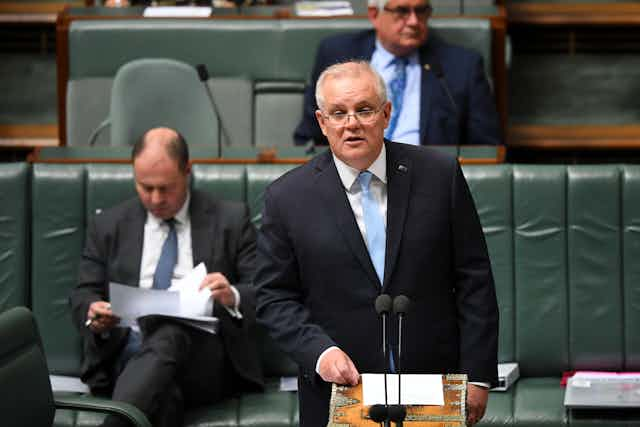Scott Morrison is finding, to his great discomfort, the royal commissioners probing aged care aren’t keeping their thoughts to themselves until their final report in February.
The week before last, commissioner Tony Pagone QC said the government should set up an expert aged care advisory body ASAP. On Friday the national cabinet did so, although Morrison chooses to play it down by describing it as an add-on to an existing group.
Now Pagone and commissioner Lynelle Briggs have declared it’s “unacceptable” there isn’t an independent body publicly reporting on the sector.
The commissioners weighed in as Scott Morrison came under a strong attack, on the first day of the parliamentary sitting, over the COVID crisis that as of Monday had taken the lives of 328 people in residential care and seven in at-home aged care.
Monday also saw the release of the government-commissioned report on Sydney’s Newmarch House, where 17 of 19 deaths were attributed to COVID, which was 46% of the COVID-positive residents. The report criticised “a lack of clarity in the relationships and hierarchy” between various state and federal government health agencies.
With Labor devoting every question in the House of Representatives to aged care, Morrison made his most explicit apology so far.
But equally, the Prime Minister went out of his way to stress COVID had hit only a very small proportion of facilities.
He told parliament there were “2706 residential aged care facilities in Australia. In 92% of these facilities, there’s been no infections… This compares sharply to many countries around the world.
"In Victoria, where there’s been high levels of transmission, 126 of the 766 facilities have outbreaks among residents and staff.
"The impact has been significant in 16 cases. And in four cases, the impact has been severe. And completely unacceptable.
"Again, I offer my apologies to the residents and families of those affected in those facilities. It was not good enough.”
Pagone and Briggs believe the eyes on the system aren’t good enough.
Releasing research conducted for the commission on monitoring, the commissioners said independent measurement and public reporting were essential for the good operation of the aged care system.
“Unbiased measurement and reporting of performance is vital to create accountability and continuous improvement in the aged care sector.
"Without it, problems are hidden from sight and not addressed,” they said in a statement.
They went further. “It is unacceptable that in 2020 the aged care system is still without this. Had the Australian Government acted upon previous reviews of aged care, the persistent problems in aged care would have been known much earlier and the suffering of many people could have been avoided.”
They referenced recommendations from the Productivity Commission in 2011, and a 2017 review of aged care quality regulatory processes.
This goes to the underlying problem – the long term faults of the system, often identified but never properly fixed.
Morrison fell back on the history of the issue as he responded in question time, saying that was why he called the royal commission.
“All governments have failed to measure up to the mark, including those who were members of governments previously who now sit opposite.”
While that’s correct, it is equally true that the Coalition is in its third term – it could have had reform under way years ago.
The research released by the commission has been done by the South Australian Health and Medical Research Institute.
It looks at a number of indicators to measure the quality of aged care, on which Australia has a mixed performance.
They include indicators for medication-related quality of care, falls and fractures, hospital re-admissions, hospitalisation for dementia and delirium, pain, premature mortality, pressure injury, use of care plans and medication reviews, and weight loss and malnutrition.
At present the federal government reports on only three indicators for residential care.
The research says: “Public reporting of quality and safety indicators may increase transparency and accountability of the system, potentially improving performance, and provide aged care recipients and their families the opportunity to make informed decisions regarding service use”.
Asked about the commissioners’ comments, Morrison said he’d wait for their report. He wasn’t going to undertake a running commentary, although he again indicated there’ll be further responses to the commission’s interim report in the budget.
He urged the opposition not to “partisanise” the commission’s activities.
But the commission, with its strong voice, now is very much caught in the partisan debate.

